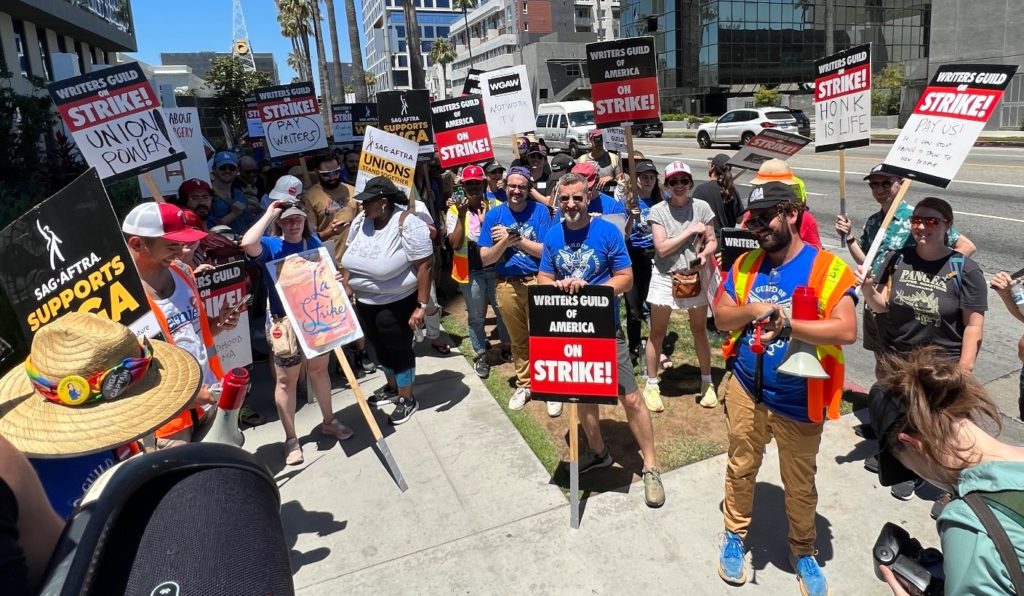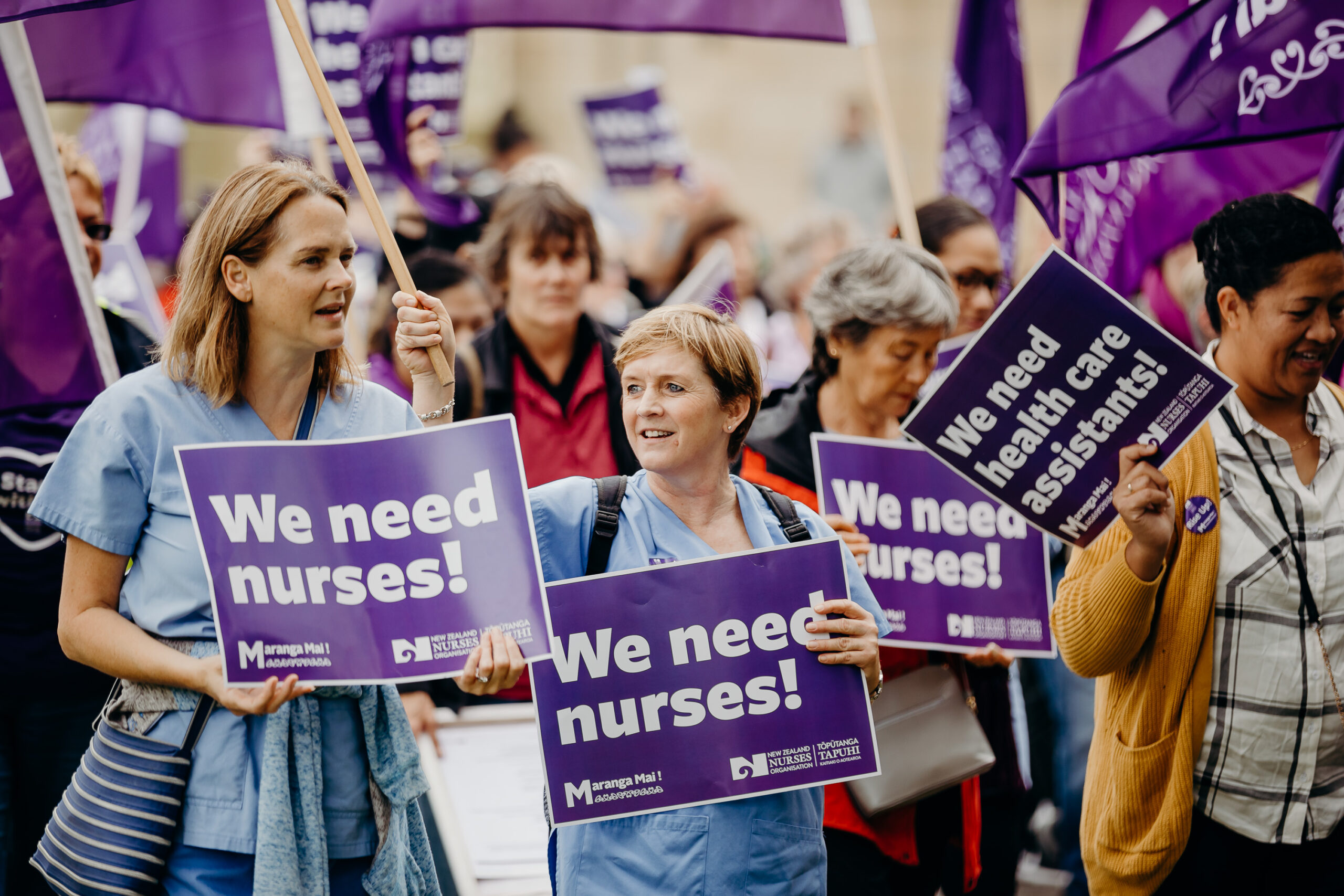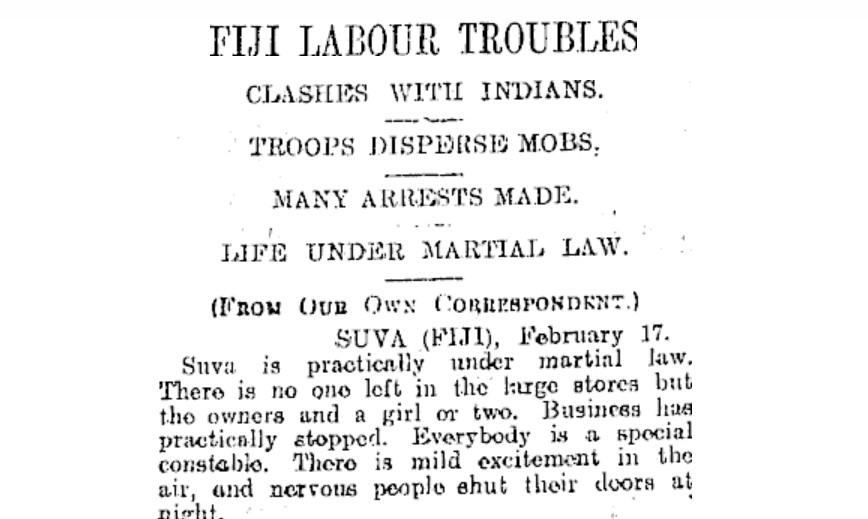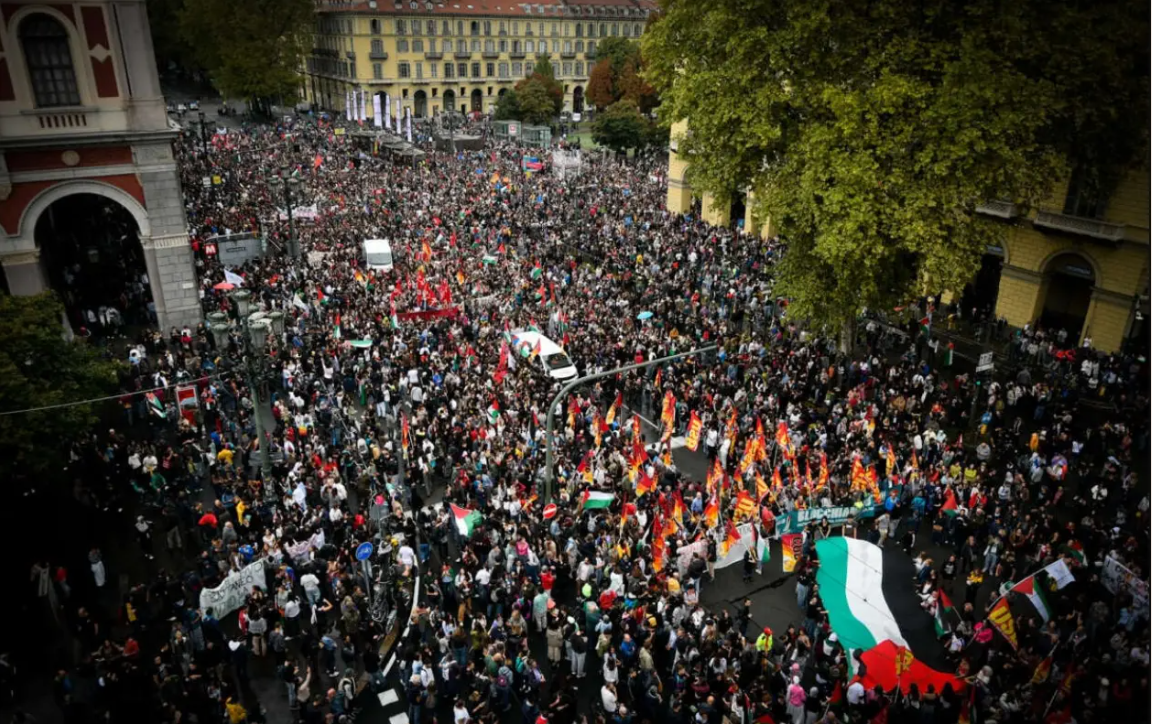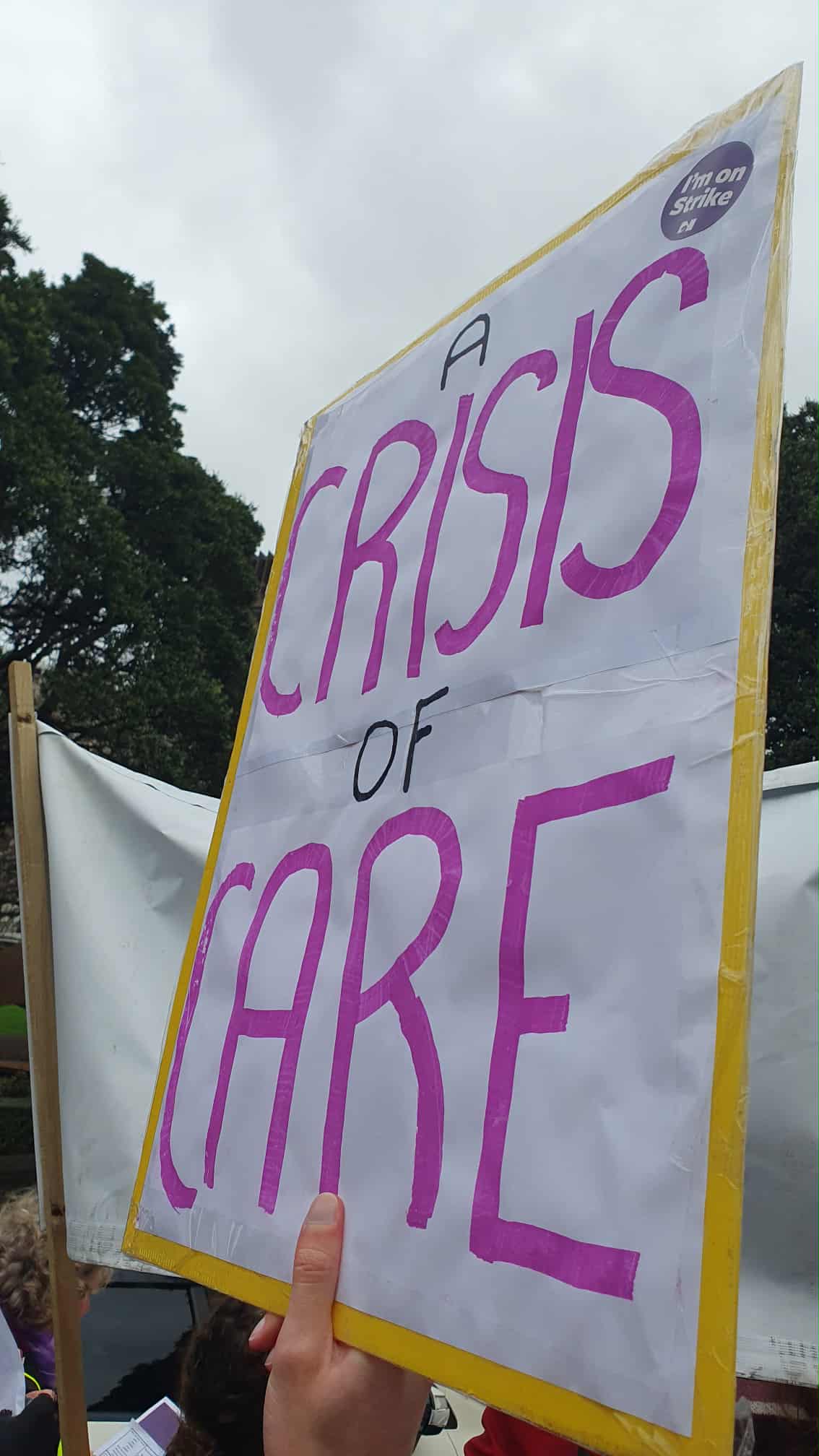What’s Happening
On May 2, 2023 more than 11,000 unionised screenwriters went on strike. In April, almost 98% of the membership of the Writers Guild of America (technically an umbrella of two unions) voted to go on strike if negotiations between them and the Alliance of Motion Picture and Television Producers (AMPTP) broke down. And break down it did.
The WGA’s primary concerns here are the near non-existent residuals (remuneration for future profits that work generates) in the streaming industry, the causalisation and “gig economy” direction of screenwriting, and the use of “AI” (that is to say, so-called generative artificial intelligence that imitates and remixes inputs of existing content).
The average screenwriter is a fairly precarious worker, participating in writing rooms and casual work to make ends meet in extremely expensive cities in the USA. The WGA has been negotiating with AMPTP, which is a “trade association” of the most concentrated capital in the world’s entertainment industry. Disney, Paramount, Sony, Apple, Netflix, Amazon and so on all hand over collective bargaining responsibilities to AMPTP, whose job is effectively to coordinate the interests of entertainment capital and reach the most exploitative contract agreements for the unions that it bargains with.
Historically, AMPTP engaged in a strategy of divide-and-conquer, insisting that individual unions engage in pattern bargaining. In other words, the employers were more organised than labour, so they would make the most exploitative deal with a union that they could, and use that to influence the other unions in the industry. Arguably, the Writers Strike of 2007 was a failure, but they learned an incredibly valuable lesson: the AMPTP will lie to the unions in order to divide them. The AMPTP is a project designed to figure out new, innovative ways to pay workers less and ensure they don’t share in the profits of the entertainment industry. In some studios, such as Netflix, the paradigm is so exploitative that there are no minimum wages or minimum contract terms for workers, so the studio could toss a writer a few dollars and hire and fire them within the day. As is always the case, “flexibility” for the employer is synonymous with precarity for the worker.
Solidarity and a Growing Strike
In a show of solidarity that has bolstered the writers strike, a huge outpouring of support arrived on many WGA picket lines in the form of SAG-AFTRA members, the huge union representing many screen actors, voice actors, journalists, singers and so on. SAG’s contracts, like most union contracts in the US, have “no strike clauses”built into their contracts, forbidding solidarity strikes (the same rule that New Zealand has baked into its national labour laws via the Employment Relations Act 2000). This means that these unionists were spending their spare time supporting their fellow creatives on picket lines, in recognition that such action was a moral imperative, and that it benefited them too.
Deadline reports that a top studio executive said the quiet part loud: the goal is the destruction of the unions, even if this requires abject poverty and homelessness of union members. “The endgame is to allow things to drag on until union members start losing their apartments and losing their houses,” a studio executive told Deadline. Acknowledging the cold-as-ice approach, several other sources reiterated the statement. One insider called it “a cruel but necessary evil.”
In a heated response, actor Ron Perlman reminds the executive “There are a lot of ways to lose your house… some of that is figuring out who said that. And where he lives. We know who said that. And where he fuckin lives.” He has since “clarified” his statement in softer language, but Perlman was more than justified (and given his high profile, this was likely anger in defence of his union comrades, not his own financial situation) . Forcing people out of their homes because they’re trying to avoid abject poverty is violence. The violence Ron implied is self-defence. Bob Iger and David Zaslav could be torn limb from limb, and it would only make the world a more peaceful place.
In any case, the SAG didn’t have to wait long for this solidarity and anger to turn into a genuine joint strike. As of July 14 2023, SAG-AFTRA is on strike alongside WGA after similar breakdowns in negotiations with AMPTP. Their demands are similar: a better health and pensions plan, limits on self-tapes (i.e.forbidding their image to be used and reinvented by AI), and the security of a career that will not become ‘gig economy’-style contractor work. What we’re witnessing now is an upsurge in the labour movement in entertainment, the scale of which we have not seen since the 1960s.
But… I Don’t Care About Rich Hollywood Actors!
As we watch the incredible solidarity between creative unions evolving in the US right now, it bears reminding: creatives, writers, actors, are of the working class. Sure, the celebrities that spring to mind when we think “actor” often benefit from the rampant exploitation in the industry, earning absurd figures that can only exist as propped up by the profit accumulation resulting from underpaying 99% of industry workers. Some of these household names earn such high figures that they inevitably cross into capitalist territory. Ryan Reynolds owns sports teams, runs a marketing agency, sells booze and spends absurd money speculating on startup ventures. Tom Cruise purchases vertical production capital, so he can be the owner rather than the worker. But these are not the rank and file writers and actors at risk of losing their homes and livelihoods right now.
What actors and writers are fighting for is sustainable income for all their members, as an alternative to gig work that bolsters the absurd coffers of entertainment CEOs, producers, and the broader ruling class with a financial stake in the industry. What they are demanding, to put it simply, is a share of the profits that they create, that are taken from them to build an entertainment empire.
The forced transfer of employees into “contractor” status is a familiar one to many workers, especially in entertainment, but also in modern tech-facilitated work like Uber, and stigmatised work such as sex work.
Today’s villains are David Zaslav, Bob Iger, Ted Sarandos, Greg Peters, and every unapologetic capitalist associated with AMPTP – but we shouldn’t forget the lessons of our homegrown anti-working class villain Peter Jackson: There is no law or political system that can’t be twisted to crush you, in the name of nationalism and profit.
What I see regarding the dismissal of hyper-rich, recognisable faces reminds me a little of what I see from the public sometimes regarding the sector that I work and organise in: tertiary education. There is an assumption that the highly visible people at the very top of the ladder are representative of an entire industry/sector. This is not the case.
For every Leonardo DiCaprio there are a thousand struggling writers and actors working day to day, paycheck to paycheck, worried about rents and mortgages.
The people taking industrial action are shutting down the production of giant Marvel and Warner Bros films to send their message. They are not privileged millionaires complaining between sips of champagne on yachts. They’re workers.
Lessons
- Divide-and-conquer makes us weak. Solidarity makes us strong. The Director’s Guild of America ratified a new labour contract in June, despite holding the same concerns as other unions. This is an outright betrayal of the industry and the members of other unions, and these directors are now presiding over empty lots, as writers and actors form picket lines to stop them working anyway. The DGA membership ought to assert ‘no confidence’ in its leadership, for weakening this historic struggle.
- SAG has rightfully made some strong decisions with regards to scab labour, that is, workers who cross picket lines specifically to replace union workers (as distinct from people who cross picket lines for work not currently covered by strike action). SAG has asserted that scabs will be dispelled from SAG, and non-union scabs will be barred from future membership. Such principles should be commonplace in a strong union that refuses to accept that its membership be undermined
- The Guild of Music Supervisors has been trying to unionise for over a year. Their membership (currently an “organisation” but not a union) has been present on picket lines, even before SAG joined the action. Strikes are the schools of class consciousness, and solidarity demands that their support is returned in kind, in the struggle for a union. All workers deserve a union
- A strike of this scale requires leadership and coordination. Teams of strike captains delegate picketing to teams who are deployed at high-profile work shoots, such as Disney TV shows. CEOs have become less and less involved in production of entertainment over the last few decades – the tool of the workers is the exact opposite. Genuine engagement on every level of leadership, everyone with an integral role to play in the strategic battles of the strike, towards the goal of the disempowerment of the studios who gatekeep profits. In this country, such tactics have not often been necessary. If we accept that workers in large private businesses should unionise and strike when necessary, we must also accept that large-scale, militant picketing will also be necessary

